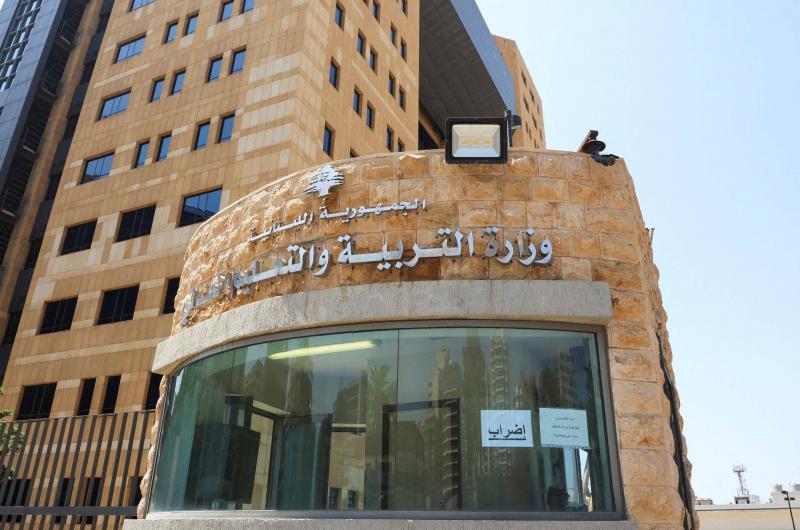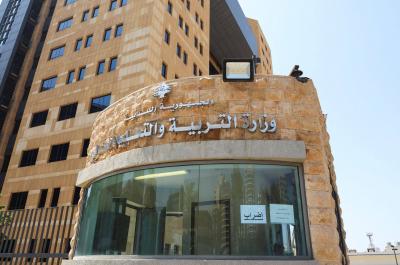The educational sector in Lebanon is suffering due to accumulated crises, much like other sectors, but the issue of education in Lebanon surpasses others as it forms the cornerstone for rebuilding a country once known as the beacon of the East, celebrated by its citizens for its scientific and intellectual wealth. Education is a weapon that opens the doors of the world for them to build the future of their dreams and support their families with much-needed funds.
"I either sell my kidney for my daughter's education, or I register her in a public school in name only, because she isn't even going." With this harsh statement, Ms. Nancy Yazbek tries to explain her suffering due to the living crisis following the unprecedented collapse of the Lebanese lira. She recalls with sorrow, "How do I tell my daughter, who has always dreamt of a Barbie bag on her first school day, that its price equals her father's income... I rushed my daughter to a public school, only to be surprised this year by the miserable situation of the schools." Nancy's case is not exceptional in Lebanon; with the recurring crises classified as one of the three largest crises in the world, parents find themselves in a reality that shatters their hopes of building a better future for their children. Majed Hilal, a father of four, expressed his sadness to "Warda" for falling behind in paying his children's tuition, mentioning the struggle he faces between transferring them to a public school and fighting to keep them in a private school. In the blink of an eye, this school year passed, as the educational file had been condemned in advance to constant turmoil under the current reality. After nearly three months of strikes at public schools, private schools joined them, leaving the fate of the academic year in the hands of a paralyzed and bankrupt state.
**Fuel Leads the Solution!**
Five liters of gasoline were enough to resume formal teaching, after Minister of Education Abbas Halabi approved five liters of gasoline daily, with a maximum of four working days per week for the staff, and three days for contracted teachers in schools, secondary schools, institutes, and technical schools. Additionally, "three hundred US dollars for the first three months of the current academic year, which preceded the New Year holiday, will be received through money transfer companies in two payments." However, teachers pointed out that gasoline is merely an entry point to a solution related to other items promised by the Minister of Education, such as productivity allowances, healthcare, and dollar incentives.
Incentives are currently unavailable. The President of the Private School Teachers Syndicate, Naama Mahfoud, confirmed in a conversation with "Warda" that the announcement of the strike came as a solution to secure transport allowances based on the price of the dollar (five liters of gasoline), in addition to demanding that private schools pay their teachers’ salaries in dollars, stressing that the salary of a Lebanese teacher has become equal to "zero." He added, "If this insane rise in the dollar continues, there will be no solution other than that we sit in our homes; we are now in hell; we cannot set any long-term plans; all those we come up with are patchwork and daily solutions.”
Contrary to the Syndicate's decision, the "Lycée Promé" school kept its doors open, as its director Abdel Mourtada told "Warda" that "the fees will not be raised at this time, as parents can no longer bear an increase in fees" and that "the relationship between the school and teachers is a long-term relationship, based more on moral than material agreements."
**Trust Between Teachers and the Ministry is "Lost"**
For his part, the media advisor to the Minister of Education, Albert Shamoun, told "Warda" that the halt to the academic year this year relates to the teachers and their demands, and that the return of public and private teachers from striking has become restricted to the rise of the dollar, adding, "The higher the dollar rises, the more we see teachers announcing strikes." However, a source from the Ministry of Education, who requested anonymity, spoke to "Warda" about an existing conflict between Minister of Education Abbas Halabi and the Ministry of Finance, as the latter points to a lack of necessary funds to fulfill the teachers' promises.
The source praised Halabi's attempts to fulfill all the provisions promised to the teachers, but the material and economic conditions prevailing in the country stand as obstacles to that. He continued, "It seems that the government has not taken the crisis in the educational sector seriously; rather, it acts as if it is unconcerned with the issues." Describing the educational situation as "catastrophic and murky," he noted that viable solutions are almost non-existent, and the measures the ministry could take against non-teaching teachers are "virtually impossible," indicating that "trust between the teachers and the ministry is lost," and the promises made by the ministry today are like "building a castle of sand."
**The Educational Sector on the Brink of Collapse**
Regarding the issue of conducting official exams, educational sources indicate that the questions that must be asked in light of these circumstances are, "Will public schools still exist? What is the fate of the educational sector? Will the Ministry of Education still persist?" These questions determine the fate of a country that was once the beacon of the East, and while awaiting answers to them, the Lebanese find themselves begging for their education after being humiliated by accumulated disappointments from a state that excels in seeking donations from foreign organizations and governments.




